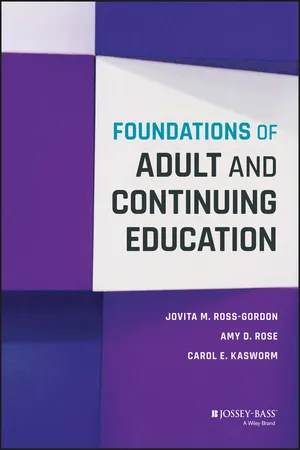
Foundations of Adult and Continuing Education
- English
- ePUB (mobile friendly)
- Available on iOS & Android
Foundations of Adult and Continuing Education
About this book
A research-based foundational overview of contemporary adult education
Foundations of Adult and Continuing Education distills decades of scholarship in the field to provide students and practitioners with an up-to-date practical resource. Grounded in research and focused on the unique needs of adult learners, this book provides a foundational overview of adult education, and an introduction to the organizations and practices developed to support adult learning in a variety of contexts. The discussion also includes select understandings of international adult education, policy, and methods alongside theoretical frameworks, contemporary and historical contexts, and the guiding principles of adult education today. Coverage of emerging issues includes the aging society, social justice, and more, with expert insight from leading authorities in the field.
Many adult educators begin practice through the context of their own experiences in the field. This book provides the broader research, theory, and practice needed for a deeper understanding of adult education and its place in society.
- Learn the key philosophical and theoretical frameworks of adult education
- Survey the landscape of the field through contemporary and historical foundations
- Examine key guiding understandings and practices targeted to adult learners
- Delve into newer concerns including technology, globalization, and more
Foundations of Adult and Continuing Education provides an expertly-led overview of the field, and an essential introduction to real-world practice.
Frequently asked questions
- Essential is ideal for learners and professionals who enjoy exploring a wide range of subjects. Access the Essential Library with 800,000+ trusted titles and best-sellers across business, personal growth, and the humanities. Includes unlimited reading time and Standard Read Aloud voice.
- Complete: Perfect for advanced learners and researchers needing full, unrestricted access. Unlock 1.4M+ books across hundreds of subjects, including academic and specialized titles. The Complete Plan also includes advanced features like Premium Read Aloud and Research Assistant.
Please note we cannot support devices running on iOS 13 and Android 7 or earlier. Learn more about using the app.
Information
Chapter 1
WHAT COUNTS AS ADULT EDUCATION?
Early Use of the Term Adult Education
Defining Adult Education
Table of contents
- Cover
- Title Page
- Copyright
- Table of Contents
- Preface
- About the Authors
- Chapter 1: What Counts as Adult Education?
- Chapter 2: Who Participates in Adult and Continuing Education?: Mapping the Adult Learning Landscape
- Chapter 3: Who Are Adult Educators, and What Do They Do?
- Chapter 4: Adult and Continuing Education as an Evolving Profession
- Chapter 5: Philosophy
- Chapter 6: Historical Perspectives: Contexts or Contours
- Chapter 7: The Adult Learner
- Chapter 8: Policy and Politics
- Chapter 9: Technology and Adult Learning
- Chapter 10: The Landscape of Adult Education: Prominent Organizational Contexts of Adult Education
- Chapter 11: The Landscape of Adult Education: Community-Based and Community Action Contexts of Adult Education
- Chapter 12: Changing Boundaries of Adult and Continuing Education
- Index
- End User License Agreement